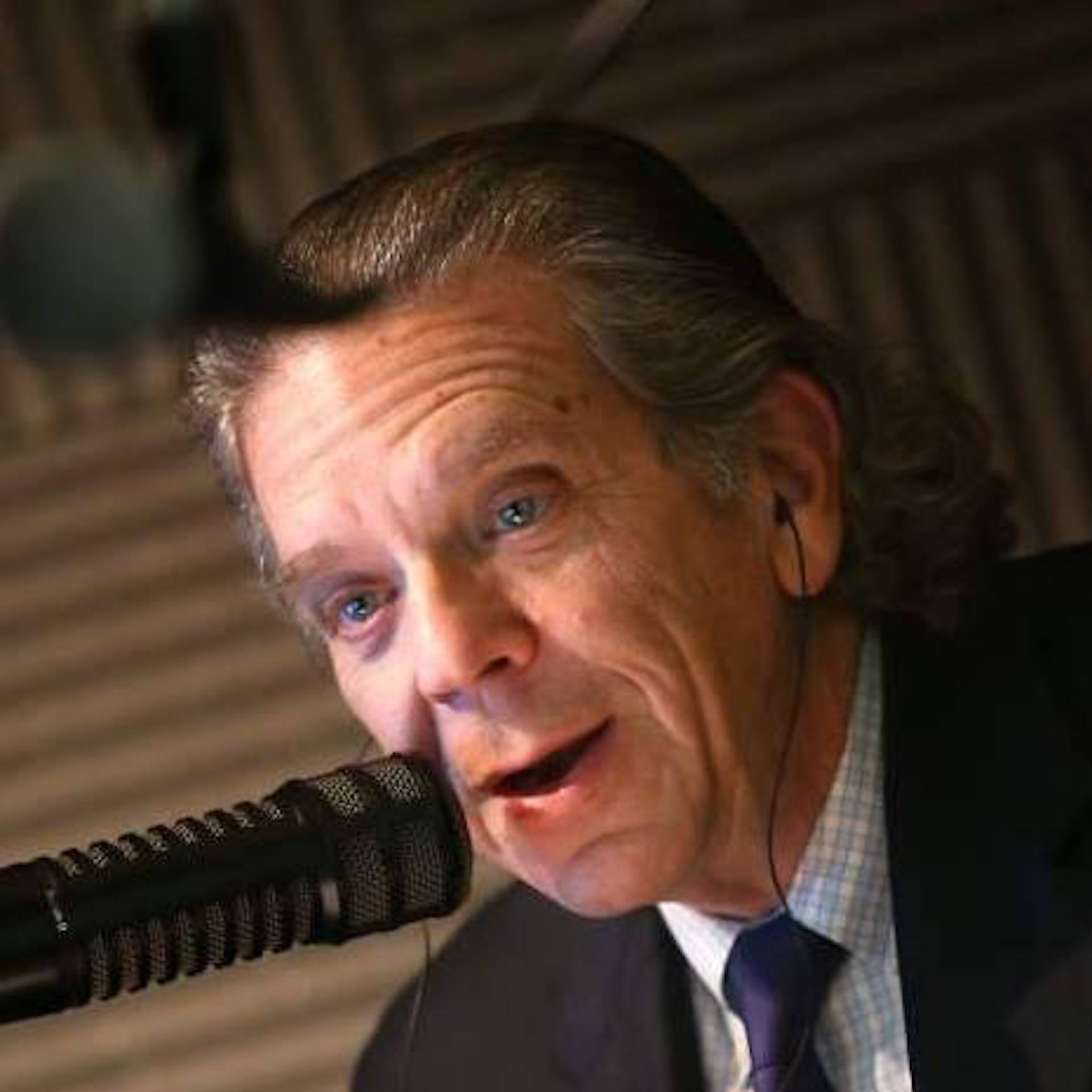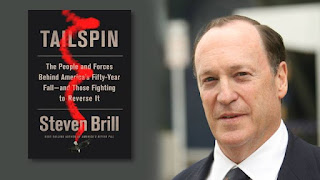Episodes
Tuesday Aug 07, 2018
The Mouth That Roared - How Rush Limbaugh Changed America
Tuesday Aug 07, 2018
Tuesday Aug 07, 2018
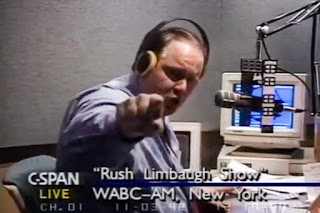 It began as a crazy idea. DJs would get bored with music and start talking to the audience. They would take calls, tell stories, and even talk a little politics, sports, and pop culture. Early on, it produced some enduring national personalities like Jean Shepherd, and Brad Crandall, Long John Nebel, and Larry King, and Barry Gray, and Joe Franklin. It was known first as Spoken Word Radio. Later, it would give way to an even more colorful and cantankerous cast of characters. People like Joe Pyne, Alan Berg and Morton Downey Jr..
It began as a crazy idea. DJs would get bored with music and start talking to the audience. They would take calls, tell stories, and even talk a little politics, sports, and pop culture. Early on, it produced some enduring national personalities like Jean Shepherd, and Brad Crandall, Long John Nebel, and Larry King, and Barry Gray, and Joe Franklin. It was known first as Spoken Word Radio. Later, it would give way to an even more colorful and cantankerous cast of characters. People like Joe Pyne, Alan Berg and Morton Downey Jr..
Talk radio moved to the big cities with folks like Don Imus and Howard Stern. In New York, Bob Grant would redefine the formula beginning in the early 70s. In fact so much of Trump on race, comes directly out of the Bob Grant playbook. Grant was the soundtrack for the New York that Donald Trump came of political age in.
The Fairness Doctrine would be repealed in 1987 and suddenly radio would be set up to have political power. Then in 1988, a little known Sacramento newscaster and talk show host named Rush Limbaugh would be let loose nationally. He took the freedom of being untethered from the Fairness Doctrine, combined it with the formulas that had already proven successful in talk, added conservative politics in a sardonic and entertaining tone, and the rest is radio history. It began 30 years ago last week, and it certainly changed our entertainment, news, and the political landscape.
To bring this all into focus, I'm joined by Michael Harrison, the editor and publisher of Talkers Magazine, the "bible of the talk radio industry."
My WhoWhatWhy.org conversation with Michael Harrison:
Sunday Aug 05, 2018
Our Crises of Connection - Why We Need to Gather Now, More Than Even
Sunday Aug 05, 2018
Sunday Aug 05, 2018
 How many gatherings do you really enjoy? Certainly not meetings. But what about social events? How many times have you felt awkward at a party, an event or even just a gathering of friends. How often have you had the feeling that everyone else was invited for dinner, and you were only invited for cocktails?
How many gatherings do you really enjoy? Certainly not meetings. But what about social events? How many times have you felt awkward at a party, an event or even just a gathering of friends. How often have you had the feeling that everyone else was invited for dinner, and you were only invited for cocktails?
And if you were the host, you made sure that all the napkins and silverware was just right, but what about the inner workings of the gathering? How did you prepare?
In a world where networking and face to face gatherings are the rare exception to being transfixed to screens, shouldn't we pay more attention to those face to face encounters? Priya Parker look at our crises of connection in The Art of Gathering: How We Meet and Why It Matters
My conversation with Priya Parker:
Friday Aug 03, 2018
Is Hope or Change Ever Possible After Trump?
Friday Aug 03, 2018
Friday Aug 03, 2018
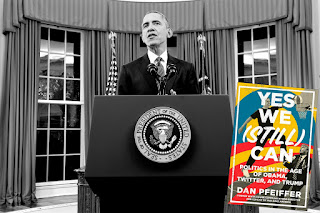 Once upon a time, hope and change formed the basis of our political discourse. That now seems so long ago. Remember a time when the Koch brothers were the enemy, when we thought John McCain was the far right, when those of us on the left thought the FBI and the justice department needed watching?
Once upon a time, hope and change formed the basis of our political discourse. That now seems so long ago. Remember a time when the Koch brothers were the enemy, when we thought John McCain was the far right, when those of us on the left thought the FBI and the justice department needed watching?
In just ten years, we’ve gone through the looking glass. Now up really down, down is up, black is white and our enemies are embraced.
Our divisions over culture, politics, race and class have been weaponized. And demographics, geography, social media and technology make it so we seldom have to interact with anyone that disagree with us.
In this atmosphere of tribalism on steroid, is any kind of positive national politics still possible? Clearly on a local or community level, there is some reason to be optimistic. However on a national level, have we digressed to a point where even the instruments of our founding father, may not bring us back.
Dan Pfeiffer is a bit more optimistic in his new book Yes We (Still) Can: Politics in the Age of Obama, Twitter, and Trump
My conversation with Dan Pfeiffer:
Thursday Aug 02, 2018
GDP = GREATLY DECEPTIVE PROSPERITY
Thursday Aug 02, 2018
Thursday Aug 02, 2018
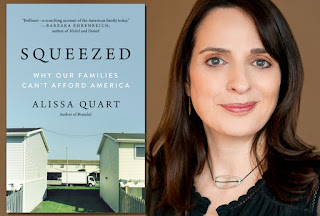 Wherever you are in the political spectrum, we should at least be able to agree on a set of facts about the forces reshaping our society. The cost of housing, particularly in our cities, continues to rise. The cost of higher education, healthcare, and quality day care continue to take a larger and larger share of individual and family incomes.
Wherever you are in the political spectrum, we should at least be able to agree on a set of facts about the forces reshaping our society. The cost of housing, particularly in our cities, continues to rise. The cost of higher education, healthcare, and quality day care continue to take a larger and larger share of individual and family incomes.
Income inequality is growing. The impact of automation and AI is only in its infancy. The freelance and gig economy, and recent political and legal moves, have shattered the ability of workers to bargain collectively. All at a time when the social safety net of Medicare, Social Security and pensions are under siege.
What was once the middle class is being hollowed out. While there is no question that some people are doing well in this economy, as evidenced by the fact that retail sales are up, housing sales, particularly driven by women, are holding steady, and the technical unemployment numbers are low. There is no question that as the song lyrics go, “there’s something happening here. What it is ain't exactly clear.” Whatever it is, the net result is hurting and squeezing a lot of people.
Alissa Quart takes us onto the front lines in Squeezed: Why Our Families Can't Afford America.
My WhoWhatWhy.org conversation with Alissa Quart:
Thursday Aug 02, 2018
Why Teams Are The New Normal
Thursday Aug 02, 2018
Thursday Aug 02, 2018
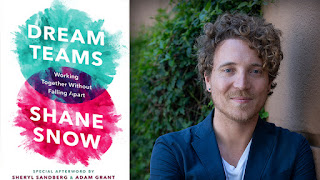 Look at any business or education sector today and discussion of teams often dominates the agenda. Teams and partnerships, particularly in business, have become not just the new normal, but almost a requirement.
Look at any business or education sector today and discussion of teams often dominates the agenda. Teams and partnerships, particularly in business, have become not just the new normal, but almost a requirement.
However for every Hewlett and Packard, Jobs and Wozniak and Brin and Page, there are many partnerships and teams that don’t work. So what’s the secret sauce? Why are some more than the sum of the parts and some carry within them the seeds of their own destruction
Science and business journalist Shane Snow digs deep into this phenomenon in Dream Teams: Working Together Without Falling Apart.
My conversation with Shane Snow:
Wednesday Aug 01, 2018
PUTIN’S INDECENT PROPOSAL
Wednesday Aug 01, 2018
Wednesday Aug 01, 2018
When Putin singled out Americans he’d like to have sent to Russia for interrogation, a lot of attention was focused on former US Ambassador Michael McFaul. He also mentioned others, including very prominent international businessman, Bill Browder. More significantly, Putin talked about the Magnitsky Act, which Browder birthed with the help of the United States Congress.
We often throw terms around today in our political and geopolitical debate like capitalist and community and oligarch, but very few who use these terms really understand the essence of what they mean. One of those that does understand is Bill Browder. He rebelled against communism as a teenager, became a very successful capitalist, and made millions in Putin’s Russia. What he didn’t know was just what kind of price he would pay for getting involved in the ever-entangled web of Putin, oligarchs, and a system 180 degrees from our own, a system of men and not of laws.
The ultimate result was the brutal death of Browder’s lawyer, Sergei Magnitsky. Browder has since carried on Magnitsky’s legacy at great personal risk to himself. Putin’s remarks underscore that Bill Browder’s ongoing quest for justice for the murder of Sergei Magnitsky has taken a dark turn under the presidency of Donald Trump.
My WhoWhatWhy conversation with Bill Browder:
Monday Jul 30, 2018
Monday Jul 30, 2018
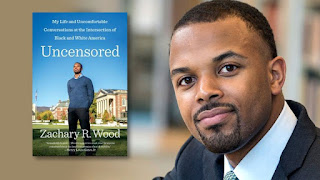 Not since the civil war have we been as tribal as a nation as we are today. What’s worse, is that today, through the power of modern communication, social media, bifurcated business models, and 24/7 news, we can be siloed from dawn to dusk. We never have to associate with people whose views are different than ours. We never have to friend people with uncomfortable or different points of view. We get our news, our products and even sometimes our meals, only from people that agree with us.
Not since the civil war have we been as tribal as a nation as we are today. What’s worse, is that today, through the power of modern communication, social media, bifurcated business models, and 24/7 news, we can be siloed from dawn to dusk. We never have to associate with people whose views are different than ours. We never have to friend people with uncomfortable or different points of view. We get our news, our products and even sometimes our meals, only from people that agree with us.
It’s all very comfortable. But what have we lost in the process. Intellectual challenge, empathy, understanding, compassion, bravery, and getting out of our comfort zone are all lost. All so we can be cocooned in the warm bath of confirmation bias.
And as bad as this is in society at large, no where is it worse than on college campuses. A world where “safe spaces” mean don’t challenge me. 50 Years ago college campuses were alive with ferment and yes, even revolution. Today, to many campuses represent a world of intellectual cowardice and laziness.
No one knows this better than former Williams College student, Zachary Wood. He writes about this experience in Uncensored: My Life and Uncomfortable Conversations at the Intersection of Black and White America.
My conversation with Zachary Wood:
Monday Jul 23, 2018
Men Behaving, Or How To Prevent More Trump Supporters In The Future
Monday Jul 23, 2018
Monday Jul 23, 2018
 There is a boy crisis in America. Girls are graduating from college in far greater numbers. Their numbers in law schools, business schools and in post graduate programs are exceeding boys, and the imbalance keeps growing.
There is a boy crisis in America. Girls are graduating from college in far greater numbers. Their numbers in law schools, business schools and in post graduate programs are exceeding boys, and the imbalance keeps growing.
Concurrently, everyday we see bad behavior on the part of men. Harvey Weinstein, Charlie Rose and the president are the tip of the proverbial iceberg. They are just the poster boys for bad behavior.
So how to stem the tide? The answer perhaps lies in understanding today's boys and the hope that by setting them on a better path as teenagers, there is hope for the 21st century.
Dr. Adam Cox has been working on just that for years. His latest work on the subject is Cracking the Boy Code: How to Understand and Talk with Boys
My conversation with Adam Cox:
Saturday Jul 21, 2018
Today's Struggle With Russia Is More Than Cold War 2.0
Saturday Jul 21, 2018
Saturday Jul 21, 2018
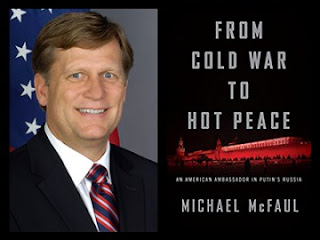 Not since the apogee of the Cold War has Russia been so paramount in our national discourse. But Churchill’s “riddle, wrapped in a mystery, inside an enigma” is a very different Russia than the former Soviet Union. Although as Churchill pointed out, Russian national interest still seems the key.
Not since the apogee of the Cold War has Russia been so paramount in our national discourse. But Churchill’s “riddle, wrapped in a mystery, inside an enigma” is a very different Russia than the former Soviet Union. Although as Churchill pointed out, Russian national interest still seems the key.
Vladimir Putin, while Russian to the core, is somehow different from Khrushchev, and Brezhnev and Gorbachev, or the Tsars that came before.
Our conflicts and tensions with Russia today are also different. We risk making a big mistake if we don’t understand modern context. If we don’t understand that this is not just Cold War 2.0, but rather a global conflict whose antecedents may be the Cold War, but whose reality is sui generis to the world in the 21st century.
Former US Ambassador to Russia Michael McFaul pulls of this together and a lot more in From Cold War to Hot Peace: An American Ambassador in Putin’s Russia.
My WhoWhatWhy.org conversation with Ambassador Michael McFaul:
Thursday Jul 19, 2018
What's the Matter With America?
Thursday Jul 19, 2018
Thursday Jul 19, 2018
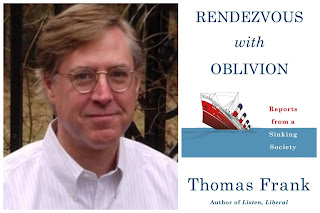 Back in 2004, a full fourteen years ago, Thomas Frank published a book entitled What’s The Matter with Kansas? In it, he looked at how a segment of the population was consistently voting against their own economic self interests. He argued that so called “culture war” issues, played to emotions that overrode economic concerns.
Back in 2004, a full fourteen years ago, Thomas Frank published a book entitled What’s The Matter with Kansas? In it, he looked at how a segment of the population was consistently voting against their own economic self interests. He argued that so called “culture war” issues, played to emotions that overrode economic concerns.
Twelve years later that trend reached its apogee with the election of Donald Trump. Therefore it’s important to remember that Trump didn’t create the economic, class and cultural divisions in America, he merely exploited them.
Those trends, fed by changes in the nature of work, technology, communication, and global economics have resulted in a society that is, in many ways, not recognizable from the America of yore. Given that, it's important to remember that the American people played a role in creating this environment, do they now have the power to fix it? Can they put Humpty Dumpty back together again?
Thomas Frank, like the Simon and Garfunkel song, has spent a long time, looking for America to try and find the answer to this question. He reports it in his new book Rendezvous with Oblivion: Reports from a Sinking Society.
My conversation with Thomas Frank:
Thursday Jul 12, 2018
Silicon Valley: The Origin Story...Live As It Happened
Thursday Jul 12, 2018
Thursday Jul 12, 2018
When we talk about change, about creative disruption, about all the ways that the world, both local and global is different, it all seems to have it’s genesis in Silicon Valley.
The games, the apps, the communication and the nature of life and work itself. But these changes were not the result of some kind technological immaculate conception. Sure they were engineered, and 0s and 1s and transistors were all a part. But this also had a cultural underpinning, based on the people, the characters and often the geniuses that migrated to the Valley
Hollywood is often been referred to as High School with money. If that’s true, then Silicon Valley has all the element of Hollywood, but its results have truly changed the world.
Capturing the zeitgeist of the Valley though all its’ ups and downs is Adam Fisher in his book Valley of Genius: The Uncensored History of Silicon Valley (As Told by the Hackers, Founders, and Freaks Who Made It Boom)
My conversation with Adam Fisher:
Monday Jul 09, 2018
Driven to Succeed...A Conversation with Dr. Ned Hallowell
Monday Jul 09, 2018
Monday Jul 09, 2018
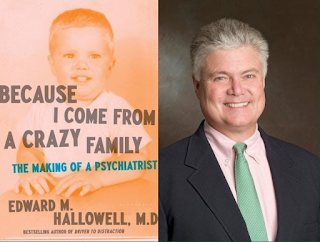 Be it the troubled minds, young and old, that commit mass shootings, the incredible and successful talents that commit suicide, or those that seek solace in alcohol or opiates, mental illness is all around us.
Be it the troubled minds, young and old, that commit mass shootings, the incredible and successful talents that commit suicide, or those that seek solace in alcohol or opiates, mental illness is all around us.
What’s encouraging is that we are finally talking about it. Not enough and not openly enough. But remember back in the 50’s there was a reluctance to even talk about cancer.
Times change. And one of the things that precipitates that change is the courage of individuals that are willing to come forward and tell their story. Suddenly when we see our friends, neighbors, even our doctors and other people like us, reveal all, suddenly that shroud falls away sunlight does it’s job.
Edward Hallowell, one of our most distinguished psychiatrists and a leading authority in the field of ADHD, has now pulled back the curtain on his own life to reveal a story of dysfunction, hope and ultimately of survival and success. He shares the story with me and in his new memoir Because I Come from a Crazy Family: The Making of a Psychiatrist.
My conversation with Ned Hallowell:
Saturday Jul 07, 2018
Nationalism and Culture Need Not be A Zero Sum Game
Saturday Jul 07, 2018
Saturday Jul 07, 2018
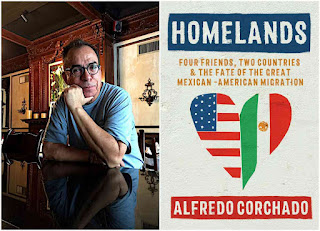 We hear over and over, that we are a nation of immigrants. Unfortunately, we’re hearing it in a boiler factory. We are hearing it over the cacophony of noise about race, about change and about security and raw politics.
We hear over and over, that we are a nation of immigrants. Unfortunately, we’re hearing it in a boiler factory. We are hearing it over the cacophony of noise about race, about change and about security and raw politics.
What’s lost is the reality of the very personal immigrant experience. What it’s like to be a stranger in a strange land. To straddle two nations, appreciate both, and not look at nationalism and culture as a zero sum game.
The immigrant experience demands a degree of self awareness that is not present in most Americans. That by itself changes that way that immigrants see themselves and the world around them. It creates a kind of heightened reality, appreciation and skepticism that most of us don't have the privilege of seeing.
That’s why we need people like award winning journalist Alfredo Corchado, who’s recent book is Homelands: Four Friends, Two Countries, and the Fate of the Great Mexican-American Migration.
My conversation with Alfredo Corchado:
Friday Jul 06, 2018
Friday Jul 06, 2018
 Fifty years ago, during the last great social and political upheaval in America, young people lead the way. The mantra of the day, of not trusting anyone over 30, defined the generational and political divide.
Fifty years ago, during the last great social and political upheaval in America, young people lead the way. The mantra of the day, of not trusting anyone over 30, defined the generational and political divide.
Today we face an altogether different, but equally powerful social and political dislocation. Except that this time we wonder, where are the young people. Where are the millennials, where is the rising generation.
Perhaps it’s why the Parkland kids struck such a resonate note. With David Hogg reminding us that the children will lead us.
But in our current divide, all sides of boomers and gen X, red and blue, are battling for the hearts, minds and soul of the millennial generation. The left has the advantage of the natural state of liberalism in the young, but the right has the organization, the business savvy and the money.
How this plays out may truly impact the fate of the republic. This is the subject of a series of stories by journalist Michael Hobbes.
My WhoWhatWhy.org conversation with Michael Hobbes:
Thursday Jul 05, 2018
Groucho Was Right!
Thursday Jul 05, 2018
Thursday Jul 05, 2018
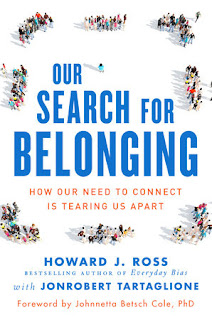 Groucho Marx famously said, upon resigning the Friars club, that he would “never want to belong to any club that would have him as a member.” That line has been used since by those that are afraid of not belonging. What better way to prevent being excluded than saying, or convincing yourself, that you don’t want to join?
Groucho Marx famously said, upon resigning the Friars club, that he would “never want to belong to any club that would have him as a member.” That line has been used since by those that are afraid of not belonging. What better way to prevent being excluded than saying, or convincing yourself, that you don’t want to join?
The facts, and our world today, tell us something entirely different. Not only do we want to belong, but we want to belong to groups that are exactly like us. While tribalism may be built into our DNA, the added anxiety and fear in our culture today, puts that tribalism on steroids.
This tribalism is enhanced by our hi-speed 24/7 world. It accentuates fear of the other, it drives our identity politics, and it fuels our confirmation bias driven life. In short, the more we want or need to belong, the more we are divided. All leading us to the conclusion that Groucho had the right idea.
This is also the idea put forth by Howard J. Ross in his new book Our Search for Belonging: How Our Need to Connect Is Tearing Us Apart.
My conversation with Howard Ross:
Wednesday Jun 27, 2018
Freedom of the Press and Freedom From Fake News
Wednesday Jun 27, 2018
Wednesday Jun 27, 2018
 The founders were wise enough that they made freedom of the press first among equals, as a constitutional guarantee. They also even understood fake news in the form of the pamphleteers of the day. But they never could have imagined bots and trolls and social media, as a way for that fake news to be disseminated at light speed. We’ve seen how lies beak from the gate quickly, and the truth can seldom seem to catch up.
The founders were wise enough that they made freedom of the press first among equals, as a constitutional guarantee. They also even understood fake news in the form of the pamphleteers of the day. But they never could have imagined bots and trolls and social media, as a way for that fake news to be disseminated at light speed. We’ve seen how lies beak from the gate quickly, and the truth can seldom seem to catch up.
For those that aren’t monitoring the news 24/7, and for the vast majority of the country that has neither the time nor resources to fact check every story, or each new online site, how are we to determine, as Stephen Colbert would say, the truthiness of stories.
We’ve seen lately that algorithms alone simply don’t work. So how can the human element be brought in, in a way that is informative and yet not intrusive? In a process that allows for advocacy, opinion and human bias, but still respects facts, expertise and professionalism? The answer might be Newsguard.
Steven Brill is the founder of American Lawyer, Court TV, Brill's Content and the Yale Journalism initiative. He’s recently confounded NewsGuard.
My conversation with Steven Brill:
Tuesday Jun 26, 2018
Can Something That's Popular, Still Be Creative and Good?
Tuesday Jun 26, 2018
Tuesday Jun 26, 2018
 There's an old axiom with respect to quality and culture that says if something is popular, it can't be very good. Certainly that's true for fast-food, overhyped action movies and maybe even some crummy literature. However, there's a way that creativity can be combined with commercial success that brings out the best of both. What's more, creativity in this regard, is not something that's limited to those that are born geniuses.
There's an old axiom with respect to quality and culture that says if something is popular, it can't be very good. Certainly that's true for fast-food, overhyped action movies and maybe even some crummy literature. However, there's a way that creativity can be combined with commercial success that brings out the best of both. What's more, creativity in this regard, is not something that's limited to those that are born geniuses.
To examine this, I talked to Allen Gannett, the author of The Creative Curve: How to Develop the Right Idea, at the Right Time.
My conversation with Allen Gannett:
Thursday Jun 21, 2018
A Dinner in Camelot: How Far We Have Fallen
Thursday Jun 21, 2018
Thursday Jun 21, 2018
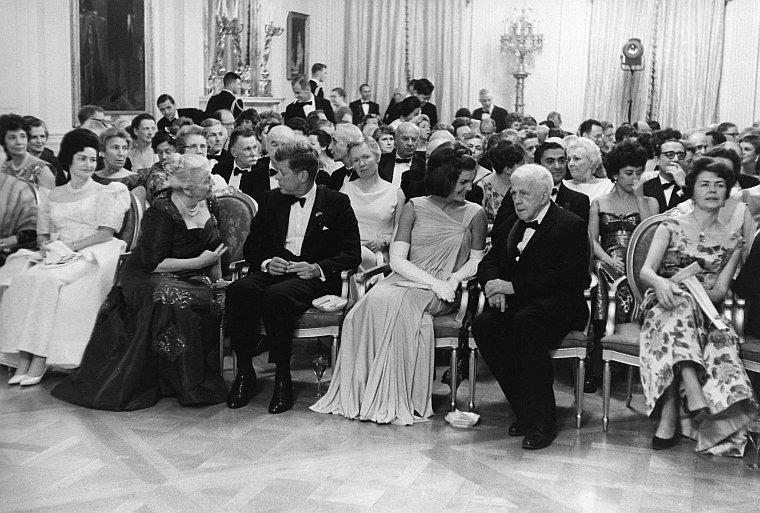
A few weeks ago , the press reported aggressively on the fact that Kim Kardashian had visited the White House. Just as it had the visits of Kid Rock and Ted Nugent before her. With homage toDr. Seuss, Oh, how far we have fallen.
On April 29, 1962, John F. Kennedy welcomed a group of Nobel Prize winners to the White House. Other guests included William Styron, James Baldwin, Mary Welsh Hemingway, Ernest Hemingway’s widow, who sat next to the President and grilled him on Cuba policy. Also there were John Glenn, historian Arthur M. Schlesinger, Jr., Researcher Linus Pauling, and Pablo Casals. Actor Fredric March gave a public recitation after the meal,
Held at the height of the Cold War, the dinner celebrated American achievement, and symbolized a time when ideas and facts were esteemed, divergent viewpoints could be respectfully discussed and the great minds of an age might all dine together in the glamour of “the people’s house.”
It was about this event that Kennedy said, “I think this is the most extraordinary collection of talent, of human knowledge, that has ever been gathered together at the White House — with the possible exception of when Thomas Jefferson dined alone.”
To revel for twenty minutes on what used to be, you’ll want to listen to Joesph Esposito, the author of Dinner in Camelot: The Night America's Greatest Scientists, Writers, and Scholars Partied at the Kennedy White House.
My conversation with Joseph Esposito:
Tuesday Jun 19, 2018
The Ultimate Silicon Valley Scam
Tuesday Jun 19, 2018
Tuesday Jun 19, 2018
 By now we are all familiar with crimes and criminals on Wall Street. Bernie Madoff, Enron, Ivan Boesky, Barry Minkow and many others that have become household names. On the West Coast, the startup world of Silicon Valley had been somewhat spared from this taint. The world of “insanely great products,” “do no evil,” and “bringing friends together,” has, at least until recently, kept it’s patina.
By now we are all familiar with crimes and criminals on Wall Street. Bernie Madoff, Enron, Ivan Boesky, Barry Minkow and many others that have become household names. On the West Coast, the startup world of Silicon Valley had been somewhat spared from this taint. The world of “insanely great products,” “do no evil,” and “bringing friends together,” has, at least until recently, kept it’s patina.
Yet in a world where people want to see the future and want to be a part of it, it certainly was a fertile ground for fraud. And no one perpetrated a greater fraud than Elizabeth Holes and her company Theranos.
The story of a company whose mission was to tell you everything about your blood, with a simple finger prick, seemed too good to be true. And like most thing that seem too good to be true, it was.
John Carreyrou is a two-time Pulitzer Prize-winning investigative reporter at The Wall Street Journal. He has, from the beginning, been the leader in telling the story of Elizabeth Holmes and Theranos. His book, soon to be a major motion picture, is Bad Blood: Secrets and Lies in a Silicon Valley Startup
My conversation with John Carreyrou:
Wednesday Jun 13, 2018
Things Can Always Get Worse in America...And They Often Have
Wednesday Jun 13, 2018
Wednesday Jun 13, 2018
 I assume that most of you believe that the state of America has seldom been worse. Racial progress, America as a melting pot, the global alliance that has seen us through the past 75 years, character, civility, and liberal democracy itself, all seem to be under siege. While this is all true, it's also true is that we’ve been here before.
I assume that most of you believe that the state of America has seldom been worse. Racial progress, America as a melting pot, the global alliance that has seen us through the past 75 years, character, civility, and liberal democracy itself, all seem to be under siege. While this is all true, it's also true is that we’ve been here before.
There have been many dark moment in American history. Maybe there is something in our very DNA that sets us up for it. But certainly from the Alien and Sedition acts though the Civil War, the industrial revolution, America First, the great depression, Jim Crow, the cold war and the tyranny of Joe McCarthy, we’ve seen that bad things happen to good countries.
Each time though we have emerged stronger. We have understood that the fault was not in our stars, but in ourselves and so we have reached deeply within ourselves for our better angels. But as the pundits of Wall Street ask all the time, is it different this time? This is the heart of Pulitzer Prize winning historian and best selling author Jon Meacham's latest work The Soul of America: The Battle for Our Better Angels
My conversation with Jon Meacham:
Monday Jun 11, 2018
The Country's Collapsing...and the Ratings are Great
Monday Jun 11, 2018
Monday Jun 11, 2018
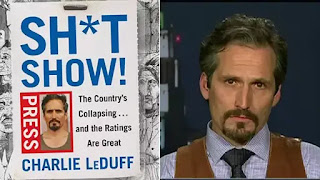 Everyday we get another glimpse of just how divided America is. The racial training at Starbucks, the horrendous tweets from Roseanne Barr, and the ongoing collection of psychotic hate filled lies from the president, are just some recent manifestations.
Everyday we get another glimpse of just how divided America is. The racial training at Starbucks, the horrendous tweets from Roseanne Barr, and the ongoing collection of psychotic hate filled lies from the president, are just some recent manifestations.
To try and understand it all, Charlie LeDuff takes the journalistic admonition to “go here,” and puts it on steroids. Charlie is part of the great tradition of participatory journalists, people like George Plimpton, and David Foster Wallace. In his latest work Sh*tshow!: The Country's Collapsing . . . and the Ratings Are Great, what he participates in is America as it is today. And for him, it is splintering, collapsing and headed down the drain and in his view, no one is really talking about it.
My conversation with Charlie LeDuff:
Monday Jun 11, 2018
Conversations with Anthony Bourdain
Monday Jun 11, 2018
Monday Jun 11, 2018
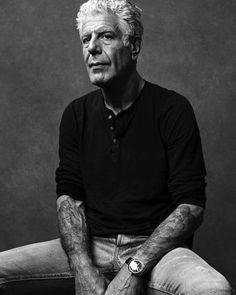 Since last weeks tragic news, many have spoken of the multiple talents of Anthony Bourdain. Over the years I had the privilege of learning about Bourdain, in his own words.
Since last weeks tragic news, many have spoken of the multiple talents of Anthony Bourdain. Over the years I had the privilege of learning about Bourdain, in his own words.
Beginning all the way back in 2002, I had the opportunity to speak with him several times. We talked about foods around the world, the lure of the restaurant business, the depressing state of food culture in America, how he got his start, and what it meant to be chef today. He told me that what he did was "like running away with the circus."
What follows are some clips from those conversations.
Thursday Jun 07, 2018
Suicide Among The Best And The Brightest: Portraits of Resilience
Thursday Jun 07, 2018
Thursday Jun 07, 2018
 The great songwriter Johnny Mandel wrote in the theme song for MASH, that “Suicide is Painless.” It’s not. The emotional pain and depression that often leads to it is anything but. Moreover the pain for the survivors is unfathomable.
The great songwriter Johnny Mandel wrote in the theme song for MASH, that “Suicide is Painless.” It’s not. The emotional pain and depression that often leads to it is anything but. Moreover the pain for the survivors is unfathomable.
Yet we have witnessing an epidemic of suicide among some of best and brightest young people today. Suicide is now the second leading cause of death among college students.
And back in 2014 and 2015, even such an esteemed institution as MIT experienced a suicide cluster, resulting in the death of 6 students and 1 faculty member.
Because of its deeply personal nature, the search for symptoms and causes needs to be more personal than clinical. After the MIT suicides an MIT computer science professor, Daniel Jackson, set out to do something to begin to understand what had happened and to help others.
What he did, reached not into the pharmacy, but into the soul of his students. These end result is Portraits of Resilience.
My conversation with Professor Daniel Jackson:
Monday Jun 04, 2018
Bobby Kennedy May Have Been The Last Genuine Progressive
Monday Jun 04, 2018
Monday Jun 04, 2018
 There are many that believe that solution of our fractured politics is simply for individuals to take power from the grassroots. That bottom up organizing is the antidote to the wave of authoritarianism that is sweeping the world.
There are many that believe that solution of our fractured politics is simply for individuals to take power from the grassroots. That bottom up organizing is the antidote to the wave of authoritarianism that is sweeping the world.
The counter to that argument is that even with committed grass roots efforts, charismatic and effective leadership is essential.
The 60’s represented the end of consensus politics in America. Since that time we have been searching for the politician or leader that could restore that. The irony has been that in this time of hyper polarity, it’s been impossible for that leader to emerge. So we look back to what might have been. And when we do, the image, the mythology and the reality of Bobby Kennedy rises as an apparition from the body politic.
He had a unique ability to to match an empathetic and compassionate agenda with the instincts of a street fighter. Something the left has not been very good at. As we mark the death of Bobby Kennedy today, I’ve joined by Richard Allen, the author of RFK: His Words for Our Times
My conversation with Richard Allen:
Saturday Jun 02, 2018
The American Tailspin: Can We Ever Pull Up?
Saturday Jun 02, 2018
Saturday Jun 02, 2018
How did our culture, politics and economy get where we are today? Just how bad is it and is it fixable? By comparison, 50 years ago, the country was truly coming apart. War, assassination and riots undermined the very fabric of America.
All of this came just twenty years after the Greatest Generation won the the war, and five years after Camelot. Out of this cauldron came of age a new generation. One, as Kennedy said, was “born in this century, tempered by war, disciplined by a hard and bitter peace, proud of our ancient heritage.”
So what happened and how does it explains today’s disfunction, chaos, distrust and tribalism? The tailspin we seem to be in, finds it origins and in turn maybe its solutions, in the the molten core of something that happened in the 1960’s
To try and find and pull these threads together, Steven Brill gives us Tailspin: The People and Forces Behind America's Fifty-Year Fall--and Those Fighting to Reverse It
My conversation with Steven Brill:
Tuesday May 29, 2018
Humans at Our Best and Worst
Tuesday May 29, 2018
Tuesday May 29, 2018
 In trying to understand what makes us tick, people still debate the old nature vs. nurture argument. Yet modern science, medicine, psychology and biology all tell us it’s far more complex.
In trying to understand what makes us tick, people still debate the old nature vs. nurture argument. Yet modern science, medicine, psychology and biology all tell us it’s far more complex.
In fact it’s a little like a variation of the uncertainty principle in physics. The very act of trying to understand our behaviors or the behavior of others, tell us more about the observers and sometimes the way in which the observer is even influenced by others behavior
This complexity is what Robert Sapolsky examines in Behave: The Biology of Humans at Our Best and Worst.
My conversation with Robert Sopolsky:
Wednesday May 23, 2018
Railroads and Highways and Ports, Oh My
Wednesday May 23, 2018
Wednesday May 23, 2018
 We hear over and over in our domestic political debates about the need to improve America’s infrastructure, that to do so is good for business and in the big picture, good for the economy and a projection of America as a global leader. Certainly, LaGuardia Airport and the 45 years it took to build the Second Avenue Subway in New York are not good indications.
We hear over and over in our domestic political debates about the need to improve America’s infrastructure, that to do so is good for business and in the big picture, good for the economy and a projection of America as a global leader. Certainly, LaGuardia Airport and the 45 years it took to build the Second Avenue Subway in New York are not good indications.
On the other side of the world, few countries have repeatedly taken on infrastructure projects as big as those taken on by China. From the movement of water to the transportation of people, the Chinese have seen infrastructure not only as good for its internal economy, but as a true projection of pride and power. Now, these projects have pierced the Chinese border in the form of China’s One Belt, One Road project. The question is, has China gone a railroad bridge too far?
This is the among the questions that Will Doig asks in his book High-Speed Empire: Chinese Expansion and the Future of Southeast Asia.
My WhoWhatWhy.org conversation with Will Doig:
Wednesday May 23, 2018
Robin
Wednesday May 23, 2018
Wednesday May 23, 2018
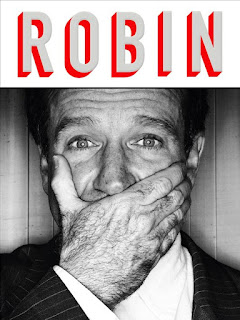 Someone once said of actors that they have their emotions much closer to the surface than the rest of us, in order to make them more easily accessible. If this is true, than it might be said that for some comedians their emotions are not just close to the surface, but raw and fully exposed.
Someone once said of actors that they have their emotions much closer to the surface than the rest of us, in order to make them more easily accessible. If this is true, than it might be said that for some comedians their emotions are not just close to the surface, but raw and fully exposed.
In the case of Robin Williams this certainly seems to have been the case. With Williams you always had the feeling that the more he exposed about himself and about the human condition, the more he made us see it and laugh about it, the more it took him to deep and dark places to find it.
With comedians it's often a question as to whether they are just reflective of the culture and the time they work in, or perhaps the way Lenny Bruce did, they actually help shape that culture.
For Williams the jury is still out. That’s why Dave Itzkoff’s new biography of Williams, Robin, is so important.
My conversation with Dave Itzkoff:
Thursday May 17, 2018
We Think It's Stormy Now.....1968 Was Far Worse....And We Survived
Thursday May 17, 2018
Thursday May 17, 2018
 Historians have long written about inflection points in history. In American history, events surrounding the Revolution, the War of 1812, the Civil War & Reconstruction, the Industrial Revolution, the Great Depression, and WWII, are all such points.
Historians have long written about inflection points in history. In American history, events surrounding the Revolution, the War of 1812, the Civil War & Reconstruction, the Industrial Revolution, the Great Depression, and WWII, are all such points.
It’s arguable that we may very well be living though another one right now. But clearly the last great historical inflection point came exactly fifty years ago, and reached its apogee in the year of 1968. Lyndon Johnson was President, and a series of events led us to believe like Yeats, “that the center cannot hold, and that mere anarchy was loose upon the land.”
The Tet Offensive, MLK and RFK assassinations, the Praque Spring, racial conflicts, the Democratic Convention in Chicago, Lyndon Johnson's decision not to seek reelection and the election of Richard Nixon and Spiro Agnew, made 1968 quite a year.
Lyndon Johnson presided over it all and that's the story that historian Kyle Longley tells in LBJ's 1968: Power, Politics, and the Presidency in America's Year of Upheaval
My conversation with Kyle Longley:
Wednesday May 16, 2018
If Gina Haspel is confirmed, will CIA torture begin anew?
Wednesday May 16, 2018
Wednesday May 16, 2018
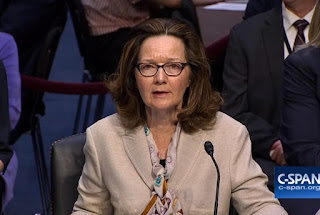 The debate over Gina Haspel running the CIA has, like most things, devolved into a partisan political debate: The usual tribes, the usual sides, and the usual arguments. But if we can only step back a bit, we see that it’s so much more. It goes to the heart of who we are as a nation, as a moral society, and whether we can ever again be that shining city on a hill.
The debate over Gina Haspel running the CIA has, like most things, devolved into a partisan political debate: The usual tribes, the usual sides, and the usual arguments. But if we can only step back a bit, we see that it’s so much more. It goes to the heart of who we are as a nation, as a moral society, and whether we can ever again be that shining city on a hill.
As the nomination becomes closer to a vote in the Senate, we’re going to talk about it with John Kiriakou, who was the first member of the intelligence community to expose the CIA’s use of torture, and as a result, became one of the very few Americans ever prosecuted under the Espionage Act, for which he served 23 months in federal prison.
My WhoWhatWhy.org conversation with John Kiriakou.
Wednesday May 16, 2018
The Moral Horror of Our Times
Wednesday May 16, 2018
Wednesday May 16, 2018
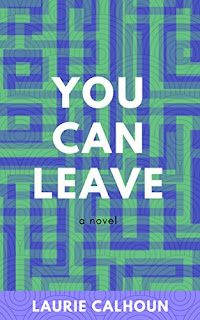 Look at any days news output, and its getting harder and harder to separate fact from fiction. Not because of fake news, but because the real news and the actions of so many cross the bounds of credible behavior.
Look at any days news output, and its getting harder and harder to separate fact from fiction. Not because of fake news, but because the real news and the actions of so many cross the bounds of credible behavior.
As someone recently pointed out, after a few recent days of the usual craziness, if someone had submitted the days real events has a script or story idea for West Wing, or Homeland or even House of Cards, , it would have been rejected as too absurd.
The sad truth is that it’s really happening. This is why it’s sometimes necessary to look at it all in the realm of fiction or specifically a kind of meta fiction. This is what Laurie Calhoun does in her novel You Can Leave.
My conversation with Laurie Calhoun:
Tuesday May 15, 2018
Moore's Law Does Not Apply To Relationships
Tuesday May 15, 2018
Tuesday May 15, 2018
 It’s become a cliche, but the fact is that in just the past 10 years, almost everything we do has changed. From the way we drive, take pictures, communicate, shop, to the way we seek relationships.
It’s become a cliche, but the fact is that in just the past 10 years, almost everything we do has changed. From the way we drive, take pictures, communicate, shop, to the way we seek relationships.
What hasn’t changed is the fundamental underlying idea of human relationships. Connecting, relating and maybe even falling in love. It’s probably a good thing that evolutionary biology is not subject to Moore's Law.
So how do we reconcile the two? How does Tinder or Match or Bumble sync up with our human needs, which have not really changed all that much in thousands of years? Trying to tie these threads together is Joanna Coles in her new book Love Rules: How to Find a Real Relationship in a Digital World
My conversation with Joanna Coles:
Saturday May 12, 2018
Globalization and its Discontents
Saturday May 12, 2018
Saturday May 12, 2018
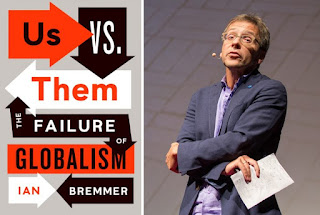 Trump, Brexit, and the worldwide populist revolution are not causes, but symptoms. Symptoms of a wider systemic plague of fear of change, anxiety, and a feeling by people of being part of a world they no longer can control or even understand.
Trump, Brexit, and the worldwide populist revolution are not causes, but symptoms. Symptoms of a wider systemic plague of fear of change, anxiety, and a feeling by people of being part of a world they no longer can control or even understand.
Technology today, rather than being a cause, is merely the host that carries the fear. Not unlike the Industrial Revolution a century ago, disruptive change takes its toll. The difference now is that it all happens at hyper speed, and in full view 24/7. How we deal with it, whether we put those that have been left behind in Hillary Clinton’s basket of deplorables, or find leadership that will lift up entire countries may very well determine the fate of the world.
Ian Bremmer, the president and founder of Eurasia Group is more on point than most in understanding all this is going on. He explains a big part of it in Us vs. Them: The Failure of Globalism.
My WhoWhatWhy.org conversation with Ian Bremmer:
Tuesday May 08, 2018
Freedom, Liberty & America...A Look Back
Tuesday May 08, 2018
Tuesday May 08, 2018
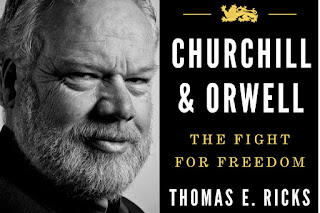 In his book Profiles in Courage, JFK writes that courage exists “when a man does what he must — in spite of personal consequences, in spite of obstacles and dangers, and pressures — and that is the basis of all human morality.”
In his book Profiles in Courage, JFK writes that courage exists “when a man does what he must — in spite of personal consequences, in spite of obstacles and dangers, and pressures — and that is the basis of all human morality.”
It’s hard to even think about this in the realm of pubic life in 2018. A time when courage is in short supply, reality is subjective and facts are not the “stubborn things” that John Adams said they were, but merely fungible talking points to gin up the base.
It’s sad then that we have to rely almost solely on history to find examples of this courage and morality. That’s where multiple Pulitzer Prize winning journalist Thomas Ricks tanks us in his joint biography Churchill and Orwell: The Fight for Freedom
My conversation with Thomas Ricks:
Thursday May 03, 2018
Dear Madam President
Thursday May 03, 2018
Thursday May 03, 2018
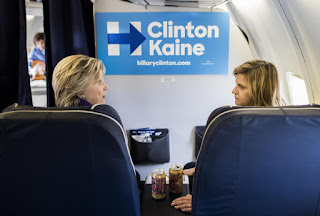 There is a line from the 1973 movie The Way We Were, where Katie Morosky, played by Barbra Streisand, talks about Hubbell Gardner, played by Robert Redford. She says of Gardner/Redford, “In a way he was like the country he lived in; everything came too easily to him.”
There is a line from the 1973 movie The Way We Were, where Katie Morosky, played by Barbra Streisand, talks about Hubbell Gardner, played by Robert Redford. She says of Gardner/Redford, “In a way he was like the country he lived in; everything came too easily to him.”
And that has been a narrative, albeit, often a false one, of ease and grace that the public often seeks to buy into with respect to its leaders. Certainly Kennedy successfully exploited it, maybe even laid the political predicate for it, in his race against Nixon in 1960. In a way it was even a part of the Obama narrative.
On the flip side, it may have very well worked against Hillary Clinton in 2016. It seems that for Hillary Clinton, nothing came easily. Everything she had ever achieved was, or appeared to be, a struggle. One that played out on the public stage for more than 40 years.
Jennifer Palmieri got to see this up close and personal as Hillary Clinton’s Communications Director, and herself a veteran of many years in politics and in the White House. She brings it all into focus in her new book Dear Madam President: An Open Letter to the Women Who Will Run the World
My conversation with Jennifer Palmieri:
Thursday May 03, 2018
The Fragility of Hope
Thursday May 03, 2018
Thursday May 03, 2018
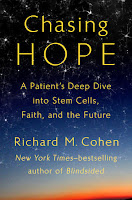 Woody Allen once said that the world was divided into the horrible and the miserable. The horrible he thought were people with terminal cases, blind people, and the crippled. “I don't know how they get through life,” he said. “It's amazing to me.”
Woody Allen once said that the world was divided into the horrible and the miserable. The horrible he thought were people with terminal cases, blind people, and the crippled. “I don't know how they get through life,” he said. “It's amazing to me.”
To answer Woody Allen's existential question, it is usually hope that carries the day. But the form that that hope takes can vary widely. Sometimes, it grows out of faith, sometimes out of denial and sometimes out of science. This is often true for both real cutting edge science, or the placebo that is most Western medicine.
Author and journalist Richard M. Cohen, has long lived with conditions Woody Allen would call horrible. Yet though his writings and his voice, he has not only defined his hope, he has given it to others. He does so once again in his look at stem cell research in Chasing Hope: A Patient's Deep Dive into Stem Cells, Faith, and the Future.
My conversation with Richard M. Cohen:
Thursday May 03, 2018
Why We Have More Time to Have No Time
Thursday May 03, 2018
Thursday May 03, 2018
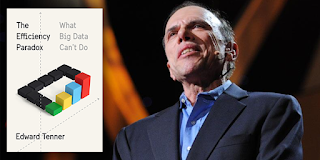 Isn’t it interesting that the more we have technology to save us time, the more we complain about not having enough time. Before the digital revolution we never heard as much talk about everyone not having enough time.
Isn’t it interesting that the more we have technology to save us time, the more we complain about not having enough time. Before the digital revolution we never heard as much talk about everyone not having enough time.
Just think about how much time we spend setting up our CRM and To do list apps, when a simple list in a notebook might have actually been faster.
And while the technology of everything from dating apps to GPS, may make things more efficient, do they actually limit our ability to see the wider world, and in so doing make us cogs in a wheel that sacrifice our humanity and our sense of wonder. That what author and distinguished scholar Edward Tenner looks at in The Efficiency Paradox: What Big Data Can't Do
My conversation with Edward Tenner:
Monday Apr 30, 2018
Immigration and the False Lure of the American Dream
Monday Apr 30, 2018
Monday Apr 30, 2018
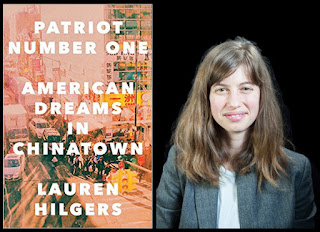 There is not a day that goes by that the subject of immigration is not in some way part of our national discussion. However, even with all the talk, there is little focus on either the large number of immigrants that arrive from China, or on the their immigrant experience.
There is not a day that goes by that the subject of immigration is not in some way part of our national discussion. However, even with all the talk, there is little focus on either the large number of immigrants that arrive from China, or on the their immigrant experience.
We think very little about what it must be like leaving one's country, friends, family and culture behind, to begin anew as a stranger in a strange land.
Perhaps if we all understood the commitment, the bravery, the strength it takes to do that, we would be having a very different conversation about immigration.
That experience is the world that Lauren Hilgers gives up a window into in Patriot Number One: American Dreams in Chinatown
My conversation with Lauren Hilgers:
Friday Apr 27, 2018
An Important Day In The Life of Robert F. Kennedy
Friday Apr 27, 2018
Friday Apr 27, 2018
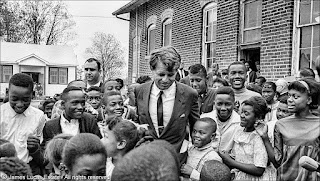 In 1964 Lyndon Johnson enacted his war on poverty. Three years later Robert Kennedy knelt in a crumbling shack in Mississippi, watching a toddler pick rice and beans off of a dirt floor. What Robert Kennedy saw on that trip would impact him personally and in part, drive is run for the Presidency one year later.
In 1964 Lyndon Johnson enacted his war on poverty. Three years later Robert Kennedy knelt in a crumbling shack in Mississippi, watching a toddler pick rice and beans off of a dirt floor. What Robert Kennedy saw on that trip would impact him personally and in part, drive is run for the Presidency one year later.
While Vietnam was the seminal issue of the day, poverty and its nexus with the civil rights movement, were very much on Kennedy’s mind.
Ellen Meacham takes us back to this transformative moment for RFK in Delta Epiphany: Robert F. Kennedy in Mississippi.
My conversation with Ellen Meacham:
Wednesday Apr 25, 2018
The 75-Year-Old Book That Drives Our Politics Today
Wednesday Apr 25, 2018
Wednesday Apr 25, 2018
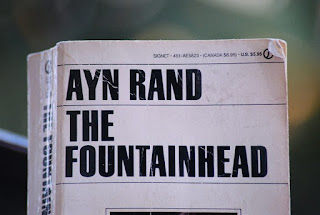 The legendary studio boss Harry Cohn once said to one of his writers, that if you want to send a political message, use Western Union. The point was that movies were for entertainment. Some have even tried to make that argument with respect to novels, but over the years, this has hardly been the case.
The legendary studio boss Harry Cohn once said to one of his writers, that if you want to send a political message, use Western Union. The point was that movies were for entertainment. Some have even tried to make that argument with respect to novels, but over the years, this has hardly been the case.
One of the great examples is Ayn Rand’s The Fountainhead. Released 75 years ago, this month. This story of ambition, love, and architecture reverberates through our political discourse today, both in middle America and in the halls of Congress. What other 75-year-old novel can spark a heated debate between Paul Ryan and Paul Krugman?
Yaron Brook is an Israeli American entrepreneur and writer. He’s the current chairman of the board of the Ayn Rand Institute where he was its executive director from 2000 to 2017 and is leading the effort to mark the 75th anniversary of The Fountainhead.
My WhoWhatWhy.org conversation with Yaron Brook:

